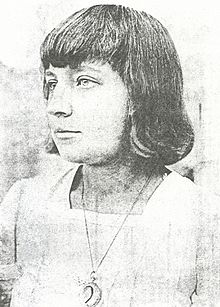Marina Tsvetaeva
Russian poet (1892 – 1941)
(Redirected from Tsvetaeva, Marina)
Marina Ivanovna Tsvetaeva (8 October 1892, Moscow – 31 August 1941, Yelabuga, Tatarstan) was a Russian poet and writer.

Quotes edit
- What is the main thing in love? To know and to hide. To know about the one you love and to hide that you love. At times the hiding (shame) overpowers the knowing (passion). The passion for the hidden — the passion for the revealed.
- The House at Old Pimen, ch. 2 (1934).
- Freedom! A wanton slut on a profligate's breast!
- You came out of a severe, well-proportioned church (1917).
- Есть книги настолько живые, но все боишься, что, пока не читал, она уже изменилась, как река — сменилась, пока жил — тоже жила, как река — шла и ушла. Никто дважды не вступал в ту же реку. А вступал ли кто дважды в ту же книгу?
- There are books so alive that you're always afraid that while you weren't reading, the book has gone and changed, has shifted like a river; while you went on living, it went on living too, and like a river moved on and moved away. No one has stepped twice into the same river. But did anyone ever step twice into the same book?
- Pushkin and Pugachev (1937)
- Тьмы низких истин нам дороже нас возвышающий обман.
- A deception that elevates us is dearer than a host of low truths.
- Pushkin and Pugachev (1937).
- As for the war – it is like this: not Alexander Blok with Rainer Maria Rilke but a machine gun with a machine gun. Not Alexander Scriabin with Richard Wagner but a dreadnought with a dreadnought. Had Blok been killed I would have mourned over Blok (the best of Russia), had Rilke been killed I would have mourned over Rilke (the best of Germany) and none of the victories, either ours or theirs, would have consoled me.
- Мать и музыка, Moscow, 1997, p. 141, cited in M. Tsvetkova "Marina Tsvetaeva and Germany. A life long romance", p. 6
Quotes about edit
- there is a Russian whom I’ve read recently with great pleasure and that is Tsvetaeva. I’ve just read her two volumes of letters straight through. What a horrible life; my God, what suffering! Now there’s a suicide that doesn’t surprise me. Who could go on with such a life? And the additional posthumous blow: she asked a writer to care for her son after her death and then he didn’t lift a finger to help the child. A truly atrocious life. During the Revolution her life was horrendous, and afterwards, in exile as well. And then when her friends turned their backs on her, she was so alone. Terrible! Serena Vitali has translated her into Italian exceptionally well and the notes are very helpful and informative.
- Natalia Ginzburg Interview (1992)
External links edit
- Marina Tsvetaeva (1892-1941) Extensive site with translations of both poetry and prose, photographs and links. Bilingual (Russian and English).
- The World of Marina Tsvetaeva (in Russian).